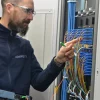UPD7 Ofcom Confirm NO Openreach Split from BT, But Change is Coming
The telecoms regulator has today published its preliminary proposals as part of a major Strategic Review of the United Kingdom’s Digital Communications market, but the big news is they’ve decided NOT to completely split BT from its national broadband and phone network (Openreach).
Openreach was setup a decade ago after Ofcom’s original review in 2005, which among other things forced BT to open part of their network to competition (“functional separation“) and introduced Local Loop Unbundling (i.e. allowing rival ISPs to install their own kit in BT’s telephone exchanges, giving them more control over ADSL broadband and phone).
Advertisement
Since then the market has evolved and the new “fibre broadband” (FTTC) services don’t offer the same kind of control or price flexibility as the older LLU ADSL solutions. Meanwhile many of BT’s rivals feel as if the operator still has too much control over Openreach and aren’t investing enough in their infrastructure, which they claim has damaged competition and performance.
By comparison BT say they’ve invested billions into the national infrastructure, are delivering a good level of service (i.e. meeting Ofcom’s targets) and claim that their rivals seek a free ride off the back of all their hard work. BT has also warned that splitting Openreach could damage their plans to invest in future “ultrafast” G.fast broadband upgrades and the 10Mbps USO (details).
Furthermore there were also fears about the risk from a protracted legal battle, concerns over how BT’s huge pension deficit and group debt would be split and uncertainty over who would provide Openreach’s future investment. On the other hand BT’s rivals believe that an independent Openreach could have fostered investment into superior FTTH/P technology and made the market more open and fair for everybody.
Ofcom’s job in all this was to navigate the maze of conflicting claims and decide what the market should look like for the next 10 years. The result is a compromise rather than total separation. Not that the outcome is good news for BT and indeed some of the measures look like painful medicine.
Advertisement
Ofcom’s Decision
In the end Ofcom’s review did find “evidence” to show that Openreach “still has an incentive to make decisions in the interests of BT, rather than BT’s competitors, which can lead to competition problems“. It also said that “other telecoms companies have not been consulted sufficiently on investment plans that affect them“, which they believe is something that needs to change.
Summary of Key Changes (inc. non BT areas)
* A new strategy has been proposed to promote the large-scale roll-out of new ultrafast broadband networks, based on cable and fibre optic lines, as an “alternative to the partly copper-based technologies” (e.g. FTTC). Openreach will be required to open up its telegraph poles and cable ducts, which must also be made “much easier for competitors to access.”
* Openreach must provide comprehensive data on the nature and location of its ducts and poles. Using these, rival ISPs will be able to build their own fibre networks, connected directly to homes and offices.
* Ofcom claims that Openreach’s governance lacks independence from BT Group and as a result they will overhaul it, which should allow Openreach to take its own decisions on budget, investment and strategy. The new management would be required to “serve all wholesale customers equally, and consult them on its investment plans“. There will also be greater transparency over how costs and assets are allocated between Openreach and the rest of BT.
* Ofcom will introduce even tougher minimum service requirements to push Openreach into repairing faults and install new lines more quickly.
* The regulator will also introduce new performance tables on quality of service, identifying the best and worst operators on a range of performance measures “so that customers can shop around with confidence“.
* Consumer broadband, phone and mobile operators will also have to introduce “automatic compensation” when things go wrong, such as due to a “loss or reduction of service” (this is a feature that used to only be offered alongside business products).
* Future auctions of radio spectrum, specifically those that will go to mobile network operators, will include new obligations to help improve rural mobile coverage.
* Ofcom will also work to make switching mobile operators easier and will soon publish a new consultation.
* Ofcom also said they would work to help the Government design a 10Mbps Universal Service Obligation for broadband, but then we already knew they would.
The regulator claims that the new model of Openreach governance (detailed proposals on this are expected to surface later in the year) might require the company to “become a ring-fenced, ‘wholly-owned subsidiary’ of BT Group, with its own purpose and board members“.
Ofcom also said that they would reserve the right to “spin-off” Openreach “as an entirely separate legal entity, with its own shareholders,” albeit only if BT doesn’t play ball with their proposals. But first the regulator will need to address this proposal with the European Commission (EC) and no doubt BT will object.
Sharon White, Ofcom Chief Executive, said:
“People across the UK today need affordable, reliable phone and broadband services. Coverage and quality are improving, but not fast enough to meet the growing expectations of consumers and businesses.
So today we’ve announced fundamental reform of the telecoms market – more competition, a new structure for Openreach, tougher performance targets, and a range of measures to boost service quality.
Together, this means a better deal for telecoms users, which will improve the services and networks that underpin how we live and work.”
The result is unlikely to please everybody and indeed we could well be back here again in the future because the issue of BT’s status in the market is a bit like the playground pinata; every now and then a group gets together to take a bite out of the seemingly unmovable object, such is the reality of being an incumbent Telco in today’s market.
Advertisement
Meanwhile there’s the question of what impact Ofcom’s changes will have upon the market, assuming all of their proposals survive the inevitable bickering match between warring operators. History tends to show that big changes need a year or so to solidify before ISPs start to take advantage of them, but some (e.g. greater access to Openreach’s network) may simply be too attractive to go unused for that long; assuming they can get the prices right (that’s a big question).
At this point we’d say that BT can already grant access to their cable ducts and poles through the Physical Infrastructure Access (PIA) solution, but this can’t be used for connecting businesses and suffers from other limitations that have limited its uptake. Hence Ofcom are proposing something much more significant.
Similarly there’s the other question of how all this will affect the price that consumers pay, particularly in regards to the impact of Ofcom’s new quality standards and a move towards automatic compensation. Both could add extra costs on to both ISPs and Openreach, which may end up being passed on to consumers (it will be difficult to do this on the cheapest ISPs without raising prices). No doubt ISPs will also want Openreach to help cover the cost of compensating for any related service outage, which in the past has often been a big bone of contention.
At this point we’ve only had a chance to glance at the report and will come back to highlight other details as the day continues. In the meantime the big question mark is over how BT will react and indeed whether or not they might find the adjustment so tough as to prefer a spin-off, but we view the latter outcome as being very unlikely. We expect their response to come at around 9am.
Finally, it’s worth saying that the changes will all be introduced gradually through Ofcom’s periodic reviews (e.g. the next Wholesale Local Access and Wholesale Broadband Market Reviews) and not in one big bang. In other words it could take a couple of years before all of today’s proposed changes are fleshed out and become real for the market.
Ofcom’s Strategic Review (Initial Conclusions)
http://stakeholders.ofcom.org.uk/telecoms/policy/digital-comms-review/dcr-feb-16/
UPDATE 8:13am
Reading through the document we note that Ofcom are not yet proposing to make any firm changes to the pricing of Openreach’s FTTC (VDSL) “fibre broadband” service, which will disappoint TalkTalk and Sky Broadband. Ofcom reasons that this could happen in the future, but it also wants to encourage rival ISPs to build their own alternatives.
“Competing providers should be incentivised to build their own networks where this is viable. It must not be too ‘easy’ for competitors to rely on ‘buying’ access to another’s network when there is the potential to invest in their own,” said Ofcom’s report.
However Ofcom’s notes that their position may change, particularly when they come to begin their next wholesale local access review that will cover the 2017-2020 period. “By 2020 superfast broadband services are predicted to account for the vast majority of broadband connections. Pricing flexibility will have been applied to BT’s FTTC investment for 10 years. For this market review, there will be a variety of arguments in favour of reduced pricing flexibility, including potentially reaching the original date for expected payback. In this context, we may be coming toward the end of the fair bet, which could result in a transition to some form of charge controls,” concluded Ofcom.
UPDATE 8:26am
BT has now given their response and it appears to include a proposal for Openreach’s new governance structure, although we’re not given any detail and thus can’t see how it compares with Ofcom’s approach.
Gavin Patterson, CEO of BT Group, said:
“The UK is ahead of its European peers when it comes to superfast broadband and we want it to maintain that position. That is why BT is keen to make significant additional investments over the next five years and beyond.
We want to build an even faster network and we also plan to address slow speeds in the final five per cent of the country. It is also important that we give small businesses further options aside from dedicated lines, which suit many but not all. Customer expectations have increased dramatically in recent years and we are keen to work with Ofcom and industry to meet those expectations. We all want to improve service. Openreach is already subject to regulated service standards and we are happy to work with Ofcom to improve them.
Our plans would help ensure the UK remains the leading digital nation in the G20 and we are keen to get on with the job. They involve large scale investment however and that requires a high degree of regulatory clarity and certainty, something that is missing at present.
Ofcom have today explained why breaking up BT would not lead to better service or more investment and that structural separation would be a last resort. We welcome those comments. The focus now needs to be on a strengthened but proportionate form of the current model and we have put forward a positive proposal that we believe can form the basis for further discussions with both Ofcom and the wider industry.
Our proposal includes a new governance structure for Openreach as well a clear commitment on investment. Openreach is already one of the most heavily regulated businesses in the world but we have volunteered to accept tighter regulation to bring matters to a clear and speedy conclusion.
We are happy to let other companies use our ducts and poles if they are genuinely keen to invest very large sums as we have done. Our ducts and poles have been open to competitors since 2009 but there has been little very interest to date. We will see if that now changes.
We are keen to understand and address Ofcom’s concerns so we will review their paper in detail. A great deal of what they are proposing is already in place and we are open to discussions about how the current rules can be amended and updated. A voluntary, binding settlement is in everyone’s interests and we will work hard to ensure one is reached.”
The Independent Networks Co-operative Association, which represents a number of alternative network operators, has also given their feedback.
Malcolm Corbett, INCA’s Chief Executive, said:
“We are disappointed that Ofcom hasn’t gone further to challenge the control BT exercises over the communications market, but pleased that Sharon White and her team have recognised the need for significant changes. INCA members build new fibre and wireless networks, often in the most challenging areas of the UK. For too long they have struggled to make sense of the rules and restrictions surrounding access to BT’s ducts and poles.
A few stout-hearted companies are having a go – notably Warwicknet, Callflow Solutions and Hyperoptic – so steps to make it it easier for competitors to use the existing infrastructure are welcome. It means faster deployment of the high speed, affordable broadband services that consumers and businesses need.”
Oh and here’s one from rival ISP Hyperoptic.
A Hyperoptic spokesperson told ISPreview.co.uk:
“Hyperoptic, the U.K’s leading 1 Gb provider, welcomes Ofcoms decision to force Openreach to properly open its duct and pole network to allow other operators to rollout competing infrastructure services. Having already trialled using those ducts to offer our 1 Gb service, we will be able to reliably and affordably offer our market leading 1 Gb service to even more consumers.
We also advise Ofcom to ensure that all customers of Openreach have a voice in future network decisions and not just those that resell the plain old vanilla FTTC services – it is those that are truly innovating that offer the UK the best chance at a digital future.”
UPDATE 8:53am
Now a statement from Sky UK.
A Sky Spokesperson said:
“We welcome Ofcom’s recognition that the current Openreach model is not working and that fundamental change is required. BT must now be held to account for improving service and enabling delivery of fibre to Britain’s homes and businesses.
Ofcom’s actions today are not the end of the debate but a staging post towards delivering the network and service that Britain needs. We believe the simplest and most effective way to fix the current broken market structure is for Openreach to be completely independent. We are pleased to see that separation is still on the table.
We will work with Ofcom to deliver change at Openreach and we look forward to playing a positive role in helping make Britain a digital world leader.”
UPDATE 9:41am
Look out, more comments from the industry. Meanwhile BT’s share price is currently hovering up by +2-3% today.
Dido Harding, CEO of TalkTalk, said:
“Ofcom has done well in identifying many of the worst problems, including recognising, finally, that BT’s control of Openreach creates a fundamental conflict of interest which hurts customers.
But having accepted all this, Ofcom has produced 100 pages of consultation with little concrete action behind it. The risk is that we end up with 10 more years of debate and delays, rather than facing into the problems and delivering improvements for frustrated customers now.”
Matthew Hare, CEO of Gigaclear, added:
“The focus on quality and performance underlying the conclusions in the Ofcom SDR are welcome. Gigaclear continues to invest in building new FTTP networks, and regardless of whether Openreach stays within the BT Group, intends to bring Gigabit Internet to tens of thousands more rural homes and businesses this year. The support for a stable investment climate will help us reach hundreds of thousands in the years ahead.”
Eli Katz, Chair of ITSPA, said:
“This once in a decade review has confirmed ITSPA members’ views that Openreach has not delivered the performance that the communications industry or the UK needs. We believe that Ofcom’s proposals for further scrutiny and an increased focus on service quality will ensure a fairer marketplace for all Openreach customers whilst also supporting vital investment in faster broadband services.
We also support the proposals to encourage the roll out of new ‘fibre to the premise’ networks by ensuring competitors have better access to BT’s mast and duct infrastructure. This will improve competition, drive up performance and service levels as well as reduce costs for both individuals and businesses in the UK.”
UPDATE 10am:
Now it’s Vodafone’s turn.
A Vodafone Spokesperson said:
“We welcome Ofcom’s move to tighten its regulation and governance of BT Openreach and leave structural separation on the table. We also welcome the move to open up BT’s ducts and poles, which we have successfully used in other countries such as Portugal to provide customers with fibre to premises.
However, BT still remains a monopoly provider with a regulated business running at a 28% profit margin. Therefore, we urge Ofcom to ensure BT reinvests the £4 billion in excess profits Openreach has generated over the last decade in bringing fibre to millions of premises across the country, and not just make half-promises to spend an unsubstantiated amount on more old copper cable: we agree with Ofcom that fibre is the future.
We look forward to engaging with Ofcom as they implement these important regulatory changes.”
UPDATE 10:15am:
Another one..
A CityFibre spokesperson said:
“It is clear from Ofcom’s key strategic proposals that Openreach cannot and will not be allowed to remain solely responsible for delivering the fit-for-purpose infrastructure essential to fulfil the UK’s digital potential. Healthy competition and continued investment in fibre from multiple companies is vital.
Ofcom’s strategy to encourage fibre investment, improve competition, and to ensure meaningful and usable access to BT’s physical infrastructure, creates a unique opportunity for alternative providers, such as CityFibre, to accelerate and extend new and existing roll-outs of next generation, ultrafast, fibre to the premises infrastructure projects nationwide.
Alternative infrastructure providers, such as CityFibre, play an increasingly crucial part in the landscape and we are encouraged to see the report explicitly reference its support for the large-scale deployment of ultrafast networks. Innovative infrastructure builders are already responding to demand from businesses and consumers for ever increasing demands for pure fibre infrastructure and companies like ours are central to a shared goal of enabling the UK to compete and succeed in a digital age.
Ofcom also recognises that at a technological level, BT’s continued strategic reliance on and investment in copper-based infrastructure – often masquerading as fibre – is inadequate to meet the soaring demand driven by new services and increased usage habits that the market continues to observe.
With major metro fibre networks in 36 UK towns and cities as well as our York project rolling out fibre to the home with Sky and TalkTalk, CityFibre is the only wholesale competitor to Openreach. We will continue to respond to market demand and play a vital role in addressing the fibre connectivity needs for mobile operators, ISPs, the public sector and consumers. The recommendations put forward in Ofcom’s strategic review today only serve to strengthen our position and ability to respond to demand for our services across the UK in the near term.”
UPDATE 11:22am:
Finally we have a comment from Virgin Media and by “finally” we mean there’s already enough commentary above and this will be the last one we add.
Tom Mockridge, Virgin Media CEO, said:
“The best way to provide competition against BT and its inherited advantages is to support infrastructure investors like Virgin Media. We are challenging the incumbent with £3bn of investment in new network and providing choice.
Ofcom has done the right thing by resisting separating Openreach, which would have sent a negative signal to infrastructure investors.”
UPDATE 12:34pm:
Ok fine.. just fine, have some more comments, but truly this is the last lot.
Giles Phelps, Managing director of Spectrum Internet, said:
“I broadly welcome the review – the industry has dramatically changed over the past ten years and so it was in much need. However, I would certainly say that the devil is in the detail. The 112 page review outlines OfCom’s plans but nothing has yet been confirmed about the key issues and actions that will be taken that the industry faces.
For example, Openreach does need reforming, which OfCom acknowledges. It’s very positive to read that it will undertake a review of 8 possible models of separation – these range from improving the governance up to a complete structural separation from the rest of BT.
I would have liked OfCom to have gone further into the quality of service that communication providers should expect from Openreach too. I believe we need to move away from copper infrastructure as much as possible in order to see an improvement. Copper lines are just outdated and not fit for customers’ needs of broadband today.”
James Blessing, Chair of the ISPA UK, said:
“ISPA is pleased that Ofcom has an ambitious vision and proposals on how the UK connectivity needs can be transformed over the next decade. With ISPA members investing heavily in their networks across the country – locally and nationally utilising a range of technologies – ISPA supports the report’s objectives to improve performance, enhance competition and investment and make rolling out networks easier in this data-driven age.”
Mark is a professional technology writer, IT consultant and computer engineer from Dorset (England), he also founded ISPreview in 1999 and enjoys analysing the latest telecoms and broadband developments. Find me on X (Twitter), Mastodon, Facebook, BlueSky, Threads.net and Linkedin.
« Government Opens Review to Improve Business Access to Broadband
Major UK ISPs to Appeal Website Blocks for Trade Mark Abuse »
















































Comments are closed